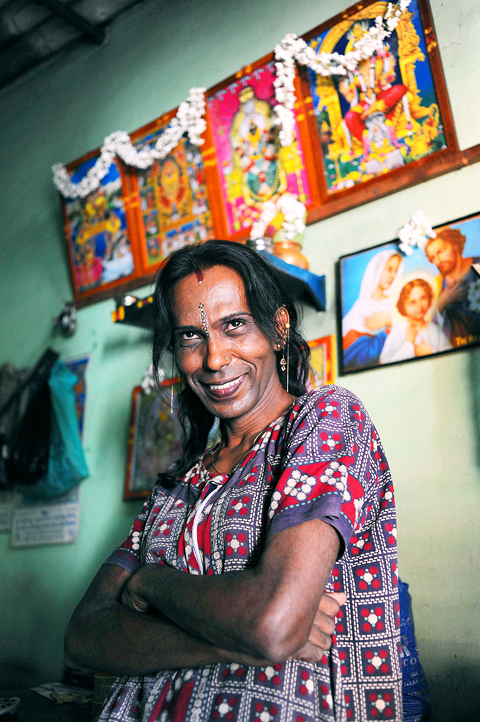India’s 1 million “eunuchs” face a unique dilemma every election season — do they stand in the men’s or women’s line at polling stations or stay away altogether?
In the past, eunuchs — the term used for cross-dressers and pre and post-operative transsexuals known as hijra — have largely abstained from casting their ballots because they are unwilling to identify themselves as male or female on voter registration forms.
While some eunuchs do vote by listing themselves as female, many are pushing for an alternative or “third sex” option on ID cards.

PHOTO: AFP
Laxmi Narayan Tripathi, a prominent eunuch activist and founder of NGO Astitva, which works with sexual minorities, has never voted and refuses to do so until there is a transgender option on ID cards.
“It’s the question of the identity of our whole community,” she said. “In spite of so many years of independence we haven’t got our own identity, our own place in the Constitution of India.”
Most eunuchs live on the outer fringes of society, ostracized and excluded from decent job opportunities and reduced to begging at traffic junctions in major cities or working in the sex trade.
Despite the stigma surrounding them, a campaign to recognize eunuchs as a third sex has yielded some results.
They can now write “E” for eunuch on passports and certain government forms, but poll stations — where they have to identify themselves as male or female — still eludes them.
“There has been quite a bit of progress, so structurally the only thing that comes in is gender politics,” said Ashok Row Kavi, chairman of the Humsafar Trust, a male sexual health non-governmental organization.
Eunuchs who want to contest in elections for greater rights have come up against similar problems, even though several have been elected to public office as women.
Last month, India’s election commission denied three eunuchs in the eastern state of Orissa permission to run as candidates unless they identified themselves as male or female.
The relatively small number of eunuchs, compared with other minority groups, means it is unlikely that any party deems them a priority vote bank, said Anil Bairwal, national coordinator for the Association of Democratic Reforms.
“Whether it will be taken up or not — as far as our political parties are concerned, the only language they understand is the language of numbers,” he said.
Month-long general elections in the world’s largest democracy began on Thursday, with the last of five phases taking place on May 13. Results are expected on May 16.

THE ‘MONSTER’: The Philippines on Saturday sent a vessel to confront a 12,000-tonne Chinese ship that had entered its exclusive economic zone The Philippines yesterday said it deployed a coast guard ship to challenge Chinese patrol boats attempting to “alter the existing status quo” of the disputed South China Sea. Philippine Coast Guard spokesman Commodore Jay Tarriela said Chinese patrol ships had this year come as close as 60 nautical miles (111km) west of the main Philippine island of Luzon. “Their goal is to normalize such deployments, and if these actions go unnoticed and unchallenged, it will enable them to alter the existing status quo,” he said in a statement. He later told reporters that Manila had deployed a coast guard ship to the area

A group of Uyghur men who were detained in Thailand more than one decade ago said that the Thai government is preparing to deport them to China, alarming activists and family members who say the men are at risk of abuse and torture if they are sent back. Forty-three Uyghur men held in Bangkok made a public appeal to halt what they called an imminent threat of deportation. “We could be imprisoned and we might even lose our lives,” the letter said. “We urgently appeal to all international organizations and countries concerned with human rights to intervene immediately to save us from

RISING TENSIONS: The nations’ three leaders discussed China’s ‘dangerous and unlawful behavior in the South China Sea,’ and agreed on the importance of continued coordination Japan, the Philippines and the US vowed to further deepen cooperation under a trilateral arrangement in the face of rising tensions in Asia’s waters, the three nations said following a call among their leaders. Japanese Prime Minister Shigeru Ishiba, Philippine President Ferdinand Marcos Jr and outgoing US President Joe Biden met via videoconference on Monday morning. Marcos’ communications office said the leaders “agreed to enhance and deepen economic, maritime and technology cooperation.” The call followed a first-of-its-kind summit meeting of Marcos, Biden and then-Japanese prime minister Fumio Kishida in Washington in April last year that led to a vow to uphold international

US president-elect Donald Trump is not typically known for his calm or reserve, but in a craftsman’s workshop in rural China he sits in divine contemplation. Cross-legged with his eyes half-closed in a pose evoking the Buddha, this porcelain version of the divisive US leader-in-waiting is the work of designer and sculptor Hong Jinshi (洪金世). The Zen-like figures — which Hong sells for between 999 and 20,000 yuan (US$136 to US$2,728) depending on their size — first went viral in 2021 on the e-commerce platform Taobao, attracting national headlines. Ahead of the real-estate magnate’s inauguration for a second term on Monday next week,